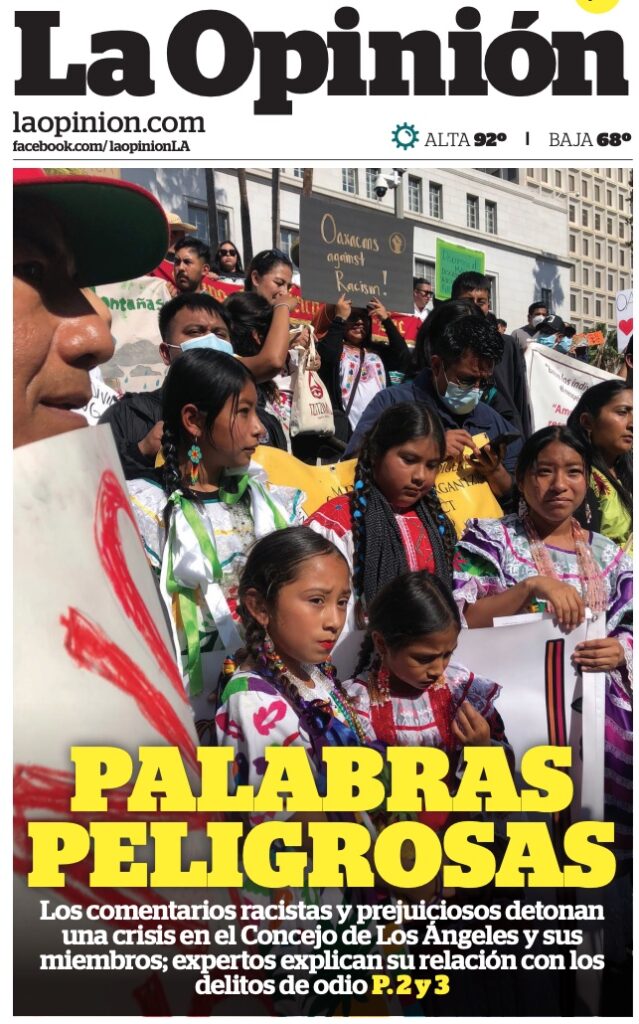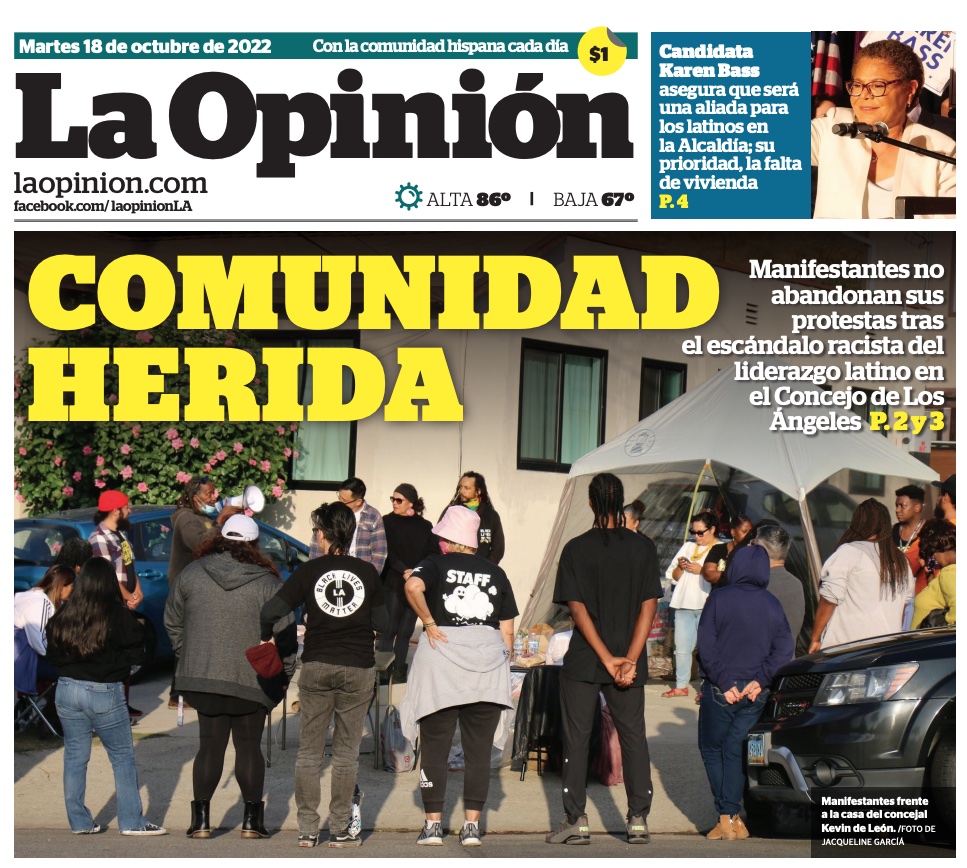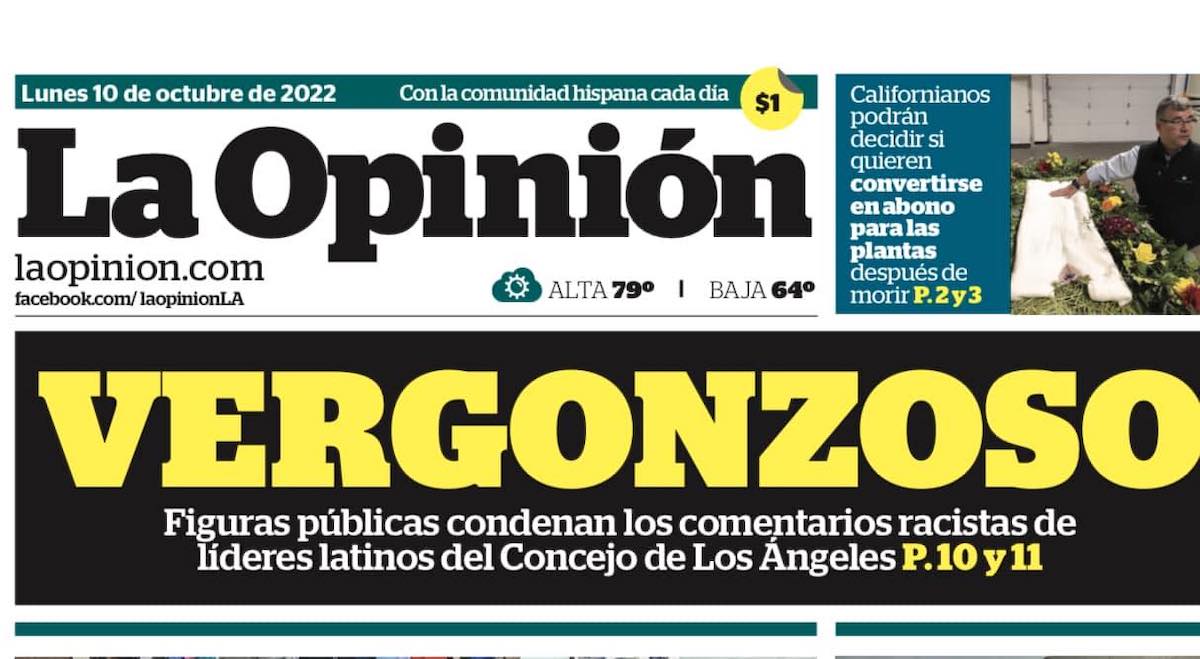Following criticism from the Oaxacan community, the paper’s editor says its coverage of the scandal has sought to capture all voices.
Editor’s note: As incidents of hate trend upwards there are also increasing incidents of inter- and intra-ethnic strife among and between communities of color. The most recent example is the leaked recording of LA’s Latino leadership making racist remarks about the city’s Black, Jewish and Indigenous residents. Ethnic media are critical in moments such as these, informing their readers and, crucially, serving as bridges between communities. It can be a tenuous position, and one La Opinión Editor Armando Varela says he embraces. (Image: A headline from La Opinión reads, Shameful, shortly after the release of the leaked audio.)
The day the L.A. Times published the audio in which three Latino councilmembers and the leader of the county’s Federation of Labor discussed voting districts using racist epithets and stereotypes, editors and reporters at La Opinión immediately went to work.
EMS spoke with La Opinión editor Armando Varela about 48 hours after the audio became known, one of several media outlets we contacted to find out how the phenomenon was being covered within the city’s Latino/a, Oaxacan and African American communities.
By Monday, before almost any other media outlet, La Opinión had published an editorial demanding the resignation of those involved. The paper had also already begun covering various angles of the story.
The front page on the day the audios were revealed bore only a single word: SHAMEFUL.
“It seems important to us that the phenomenon of racism, not only as a political issue but in the daily life of the community, be confronted and attacked and denounced,” said Varela in his interview with EMS.
“These attitudes are not born of a vacuum but of a cultural manifestation… in this context, the newspaper is doing what we always do, which is to denounce these situations to remedy them,” added Varela.
Varela described the remarks as “a sadly definitive event for Latinos and the entire Los Angeles community, and as such, we are giving it all the coverage it deserves.”



Days after that conversation, La Opinión — the oldest Spanish-language newspaper in Los Angeles, in existence since 1926 — and one of its most experienced reporters in the community, Araceli Martínez Ortega, came under fire from Oaxacan community leaders.
The tensions were sparked by an article posted by Martínez on Twitter, in which she quotes several leaders from Los Angeles’ sizable Central American community, who pushed back against what they describe as a “political lynching” of Councilman Kevin De León, among those implicated in the recording.
De León, a veteran politician and among California’s most prominent Latino leaders, has had long-standing ties to the groups quoted in the piece, which highlighted concerns about the low levels of Latino/a representation in Los Angeles, where Latinos account for more than half the population.
That piece was followed by an interview with De León, also by Martínez. The blowback on Twitter was swift, accusing La Opinión of representing “the Latino community that violates indigenous people” and repeatedly accusing Martínez of being a racist.
De León has been making the public relations “rounds” in various media outlets. He was on African American journalist Tavis Smiley’s radio show on LA’s KBLA 1580 last week. A few days later, he appeared on Univision, interviewed by Leon Krauze.
In an interview with EMS, Oaxacan leader Arcenio López, director of the Mixteco/Indigena Community Organizing Project (MICOP) in Ventura County, criticized La Opinión’s coverage, taking aim at its use of the term “political lynching” in its headline, a term López noted has a fraught meaning for Indigenous and Black communities.
The paper, López said, appeared to be giving voice to the “perpetrator” rather than to the victims — in this case, Indigenous communities.
The question that emerges is one that ethnic media — indeed, all media — are contending with: what role can and should media play in covering hate at a moment when our politics have descended into zero-sum competitions over power, influence and representation.
For Varela, part of the answer is to cover all the angles.
His paper and at least three of its regular reporters or contributors, including Martínez, Jorge Macías and Jaqueline García, have covered the Oaxacan protests and marches that followed in the wake of the leaked audio, as well as developments in LA’s City Council, criticism from all sides against De León and demands for more representation for the city’s indigenous community.
Varela also noted the newspaper has a history of covering the Oaxacan community that dates back long before this scandal erupted, including reporting by Martínez on the effects of Covid 19 in Indigenous communities in the United States, the efforts of Oaxacans to help earthquake victims in Mexico, along with stories on small business owners and artists in the community.
Days after López’ comments Varela spoke with the veteran organizer to show him his paper’s coverage of the scandal and its aftermath, and to emphasize its position on the resignation of those involved. He also stressed that use of the term “political lynching” was taken from direct quotes by community members.
“I understand and share that anger,” said Varela of the response from LA’s Indigenous communities. “They have been marginalized and we are in solidarity with that.”
But, he continued, “I feel that the newspaper is part of the solution and not part of the problem.”
Pilar Marrero, associate editor of EMS, worked as a reporter and editor for La Opinión for 26 years.
EMS’ Stop The Hate initiative is made possible with funding from the California State Library (CSL) in partnership with the California Commission on Asian and Pacific Islander American Affairs (CAPIAA). The views expressed on this website and other materials produced by EMS do not necessarily reflect the official policies of the CSL, CAPIAA or the California government. To report a hate incident or hate crime and get support, go to CA vs Hate.





